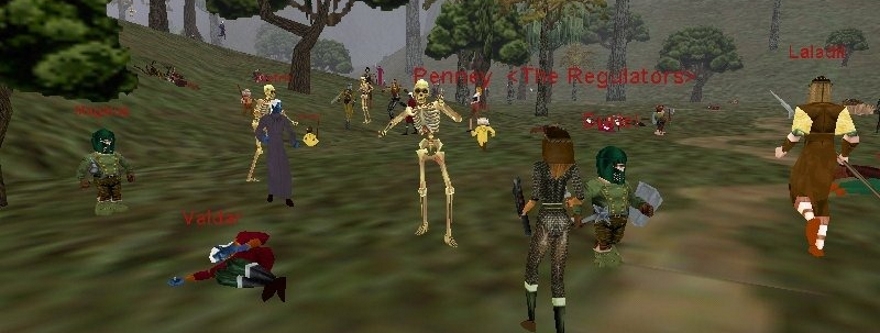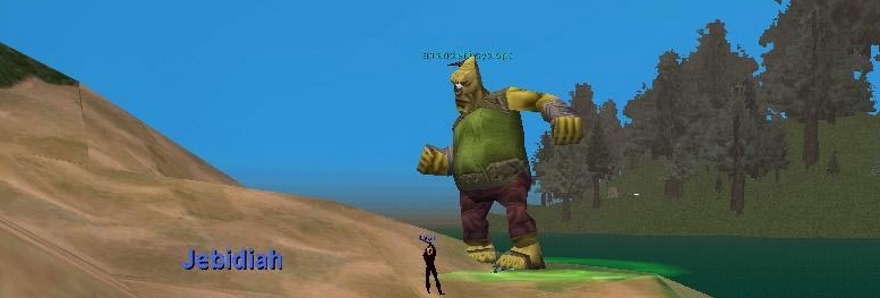
A couple of weeks ago I shared with you several stories from EverQuest veterans about what life in the game was like back then. Since the EverQuest we have now would be near-unrecognizable to 1999-era players, I felt it was important to preserve these tales for future generations of MMO gamers.
But EverQuest being EverQuest, players couldn’t just stop with a mere handful of accounts! Thus, I saved several of those submitted to share with you today. What were more facts of life that Norrathians had to deal with back then? Find out!
 1. No, not that kind of camping
1. No, not that kind of camping
“Every zone had popular spots for groups to set up a ‘camp’ and remain there for some duration, pulling the same mobs over and over, spawn after spawn. When a new group would form in a zone, they would call out for a ‘camp check’ and the various groups in the zone would respond, letting them know which spots were taken and hopefully which were still open.” (Gamhuin)
“First thing that comes to mind are camp sites. Players created camp sites that were basically designated kill zones. For example, the group would stay at the camp while the “puller” (player designated to pull mobs to group) would grab a mob and pull to the camp for tank to pick up and group to kill. These groups would have waiting lists to join the group. Every zone had them, and players respected the system.” (Joshua O.)
“It took minutes to regenerate all your mana, and perhaps a half hour or more to regenerate all your health. Most dungeon mobs were on a 20- or 30-minute spawn timer. So, what did you do when your group established a nice camping spot for the rare and valuable item? You interacted with the people in your group, and you made lasting friendships. I made really close friends during that time.” (Jeremy H.)
2. Kill-on-sight (KOS)
“The game had all that kill-on-sight nonsense (or awesomeness, depending on your perspective). Each city or faction had specific bias toward or against certain races or classes. If you were, say, a Dwarf Paladin, you were free to do as you pleased in most areas. NPCs would leave you alone, or maybe even give you a discount. But if you were to play a race or class a specific zone’s denizens hated, they deny you quests or vendor items (at best). If they really hated you (such as a Dark Elf Necromancer), the town guards and other NPCs would just attack you, kill you, and cause you to spend a few hours or even days trying to get your belongings off your fiercely guarded (and hated) corpse.” (B.J.)
“Do the right quests, kill the right foes, and you may make an ally out of an enemy faction. My Troll was eventually welcome to take a stroll through Freeport, Kaladim, and Kelethin, where my Gnome couldn’t set foot anywhere that had an Elf in a mile-wide radius without them wanting his head for his abominable acts.” (Gamhuin)
 3. Boss spawn politics
3. Boss spawn politics
“I’m having a hard time thinking of another MMO that used as many highly desirable, non-instanced bosses on a long respawn timer. Guild cohesion and efficiency was crucial in order to mobilize and take down these bosses before the other raid-capable guilds could do so. This also led to a lot of server-level guild politics and eventually organized rotations. On my server, The Tribunal, a guild needed to prove they could reliably drop a given boss before they would be allowed into the rotation. The drama this sometimes caused was epic in its time. Schedule jumpers were harshly dealt with inside the server community.” (Michael R.)
4. Corpse runs
“If you died you had a time limit on getting back to your corpse and getting your things. Usually it wasn’t a big deal to get back. But death in some zones or dying to lag/disconnect and having no idea where your body lay was painful. Necros (and I believe Bards) were great for having a skill to find your corpse if it was lost.” (Bill C.)
“When you died, left your body and gear behind. While it was safe from looters, you still had to make your way back to it — and sometimes that was a pretty fair distance to travel with no gear (and in the case of humans, being utterly blind at night. Plus, when you died you lost a percentage of your XP and could actually lose a level. Very traumatic.” (Gamhuin)
“There was always an element of danger to exploring a new place because there was a possibility of losing everything. Oh, and the other fun part of dying was losing XP, sometimes losing your level as a result.” (Jeremy H.)
5. Uneven mob spread
“There was a mixture of low and rarer high-level mobs in the same zone, which allowed for memorable enemies and promoted community interaction.” (Bob S.)
“Zones weren’t always level-appropriate. A zone with level 10 mobs would still have level 50 mobs roaming around that would slaughter all those unsuspecting and unaware. You had to be on your toes.” (Bill C.)
 6. Learning languages
6. Learning languages
“Each race had its own language, and to learn the other races’ languages, a person had to sit with their character and ‘listen’ to the other person speak the language they were trying to learn. I remember players forming groups and one player would just spam their language for quite a while. I cannot say that was a fun mechanic, but it made for some interesting times when you met up with a character of a different race that didn’t know the common tongue.” (Ken S.)
7. The time before exclamation points
“The quest system was interesting because there were no quest markers or indicators at all. You could randomly find quests by talking to NPCs and then you would have to actually remember what they said and use that to figure out where to go next. Often, an the next NPC wouldn’t respond to you unless you used a keyword from the first NPC encounter and actually said it via /say. It was really a different time in MMOs.” (Drew N.)
“There were very few quest hubs. Instead, items would drop that you required you to go find the appropriate NPC to turn in or sometimes sell or give to other players. It made questing feel more organic.” (Bob S.)
“There were some quests in EQ that took players months to figure out, simply because the clues were obscure and required a detailed knowledge of the game’s lore.” (David B.)
 8. Train to zone!
8. Train to zone!
“Mobs would chase you forever until you left the zone, died, or killed them. Once they lost their aggro target (they killed you or you zoned), they would momentarily stand there, then start making their way back home — but they would aggro on anything that got near them. This would often prove deadly when someone was zoning in unaware that someone had just fled, taking 80 angry gnolls with them to the zone where you are just about to appear completely unprepared.” (Gamhuin)
“If mobs were rooted they’d fight the nearest player, and if they got away they’d aggro others. This led to things like trains in zones.” (Bob S.)
9. Time allocation
“Something that sticks out to me that is different from now and then is the thought process of time allocation. Now games are created to jump in, spend ten minutes or whatever time you have to spare. Back then I would have think to myself: Do I have enough time to log in knowing that I may die and I may have to wait a while for someone to rez my corpse or for me to retrieve it? If I knew I wouldn’t have enough time to deal with that possible scenario, I wouldn’t log in. There was more risk back then.” (Hieru)
10. Meet the GMs
“One thing I remember fondly about 1999 era EverQuest were the close interactions between the staff and the players. GMs and guides were so visible; they’d appear in the game world when rendering aid, and they would sometimes hang out and chat with the players. When you made level 20, you had to submit an in-game ticket to have a GM come and give you your surname. I remember when I first hit level 20 and requested my surname. I was in Lake Rathe, grouped with my friends, and the GM appeared in front of everyone and manually granted my surname on the spot. It was a really cool moment that I’ll never forget.” (Jeremy H.)
I want to spend out a big “thank you!” to everyone who sent in these (and many more!) excellent EverQuest stories. I think it was informative and entertaining to read through all of these!
 Believe it or not, MMOs did exist prior to World of Warcraft! Every two weeks, The Game Archaeologist looks back at classic online games and their history to learn a thing or two about where the industry came from… and where it might be heading.
Believe it or not, MMOs did exist prior to World of Warcraft! Every two weeks, The Game Archaeologist looks back at classic online games and their history to learn a thing or two about where the industry came from… and where it might be heading.













